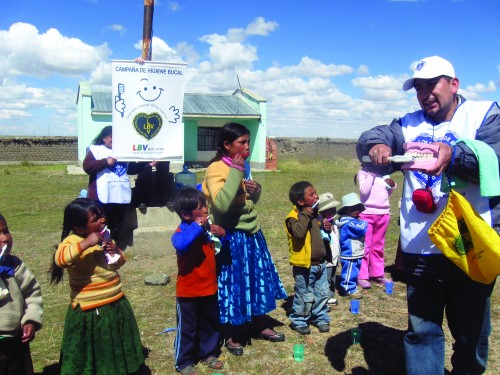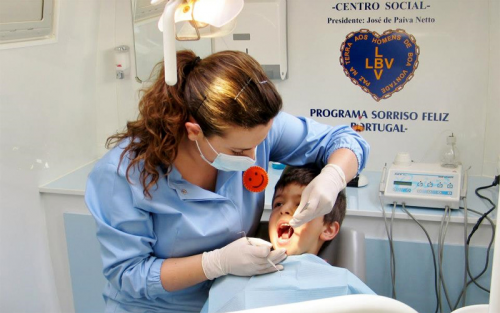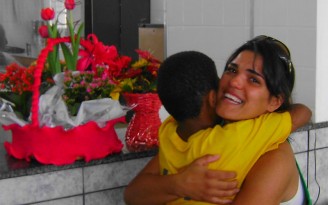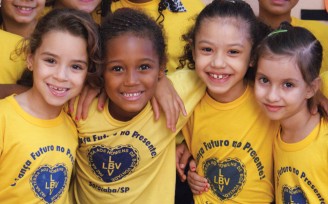
Social technologies and sustainability
By the Editorial Staff
Friday | January 29, 2016 | 12:19 PM | Last update: September 22, 2016, 4:07 PM (Brasilia time)
On a daily basis, the Legion of Good Will’s assistance network benefits thousands of people, not only in Brazil but also in the six other countries where it has autonomous bases. Decades after its establishment, the LBV now has approximately 100 centers, located in South and North America as well as in Europe. In these units, modern social technologies are applied in the Organization’s educational and socio-assistance services. These programs involve replicable techniques and methodologies, promoting good responsible practices so as to offer the community the solutions needed to enact their own betterment.
To develop its social inclusion programs and projects towards sustainable development, the LBV establishes partnerships with agents from technical and scientific fields to meet public demands for food, education, income, health, and environment.
The LBV in the Bolivian Andean plateau (the Altiplano)
Since 1986, the Legion of Good Will of Bolivia, located in the capital city of La Paz, has been carrying out important socio-assistance programs. It maintains the Jesus Nursery School, which helps children between the ages of two and five who come from families living in vulnerable situations.

Two of these programs—Education in Action and Clean Teeth, Healthy Children—are examples of how social technologies play a fundamental role in regions that are lacking in infrastructure and are far away from large urban centers.
This year, seven educational centers in Collana Tolar, located 68 kilometers outside La Paz, benefited from the programs: Centro Belén, Nueva Esperanza, Taracollo, Huancarani, Wichicollo, Franz Tamayo, and Quillcoma. The region is populated by small rural communities of indigenous origin, which are traditional in the Bolivian Andean plateau.
Education for all
With the goals of reducing grade repetition and dropout rates, as well as investing in quality education, the Legion of Good Will of Bolivia has developed the Education in Action program. Since 2010, this program has worked successfully to contribute to the fulfillment of the second Millennium Development Goal: “Achieve universal primary education”.
In April, for example, the Education in Action program handed out hundreds of academic and school supply kits and provided training workshops for teachers. Importance was placed on the strategies and resources used for facilitating learning. This included creating bonds between teachers and students, as well as promoting ways to include parents in these activities.
For Federico Chira, teacher and general director of the educational centers of the community of Franz Tamayo, the LBV’s program represents an important encouragement for everybody: “Thank you! On behalf of the teachers and family members of the students, I thank you because this material is complete. This encourages children to go to school. We never had this type of support before, which is why we’re very grateful.”
Clean Teeth, Healthy Children
This program is responsible for holding oral health workshops, which provide information about brushing techniques, and distributing personal oral hygiene kits. The work is undertaken in partnership with professors and students from the Franz Tamayo and El Alto universities and is divided into three stages.

The first stage consists of a visit to different communities in order to identify and prepare a register of people who will be assisted. In the next stage, volunteer dentists give talks that provide guidance for parents, teachers, and students on the importance of brushing their teeth correctly. This is followed by dental care services, which includes the treatment for tooth decay and the application of fluoride, as well as tooth extraction surgery, if necessary. Each dental hygiene kit, which is distributed to every child, is equipped with: a mug, a child-sized toothbrush, a tube of toothpaste, a towel, a bar of soap, and a backpack to keep all the items in.
In the third and final stage of this program, there is a return visit to the same schools in order to reinforce preventive practices by way of a workshop entitled “Periodontal Diseases”. The toothbrushes that were initially distributed by the program are also replaced and an individual assessment is carried out by means of a recreational activity to check if the students have learned the good oral hygiene habits.
Teachers and health professionals alike highlight the value of this program in these rural communities, in which a large portion of the population does not even have a toothbrush, and those who do often share it with other family members. Teacher Orlando Marca Rodríguez, from the Rosa Grover School, says: “Few of us are concerned with dental hygiene and there’s little information available about it. In the name of the community and the children who were benefited from this campaign, I want to express my deepest thanks to the LBV, which assumed the role of helping with this work.”
A volunteer dentist in the LBV’s program, Dr. Jimena Ajata, from the Public University of El Alto, does not hide her satisfaction of participating in this socio-educational action, adding:“The work you’re doing is beautiful. I’m happy to see [this support] reach the population which is most in need of it and also the very young people.”


